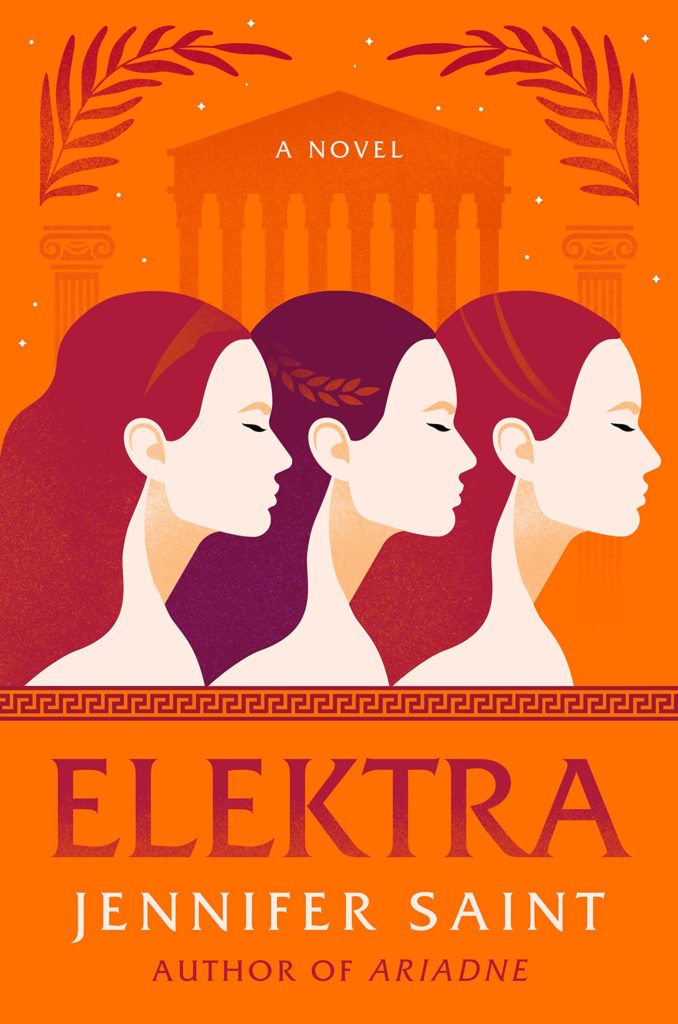From the title alone, I was so excited for Elektra. I’ve been, with everyone else, on this Greek Mythology kick. And so after Ariadne, I was intrigued by Elektra. But what I got was something I was not expecting. Keep reading this book review for my full thoughts.
Summary
The House of Atreus is cursed. A bloodline tainted by a generational cycle of violence and vengeance. This is the story of three women, their fates inextricably tied to this curse, and the fickle nature of men and gods.
Clytemnestra
The sister of Helen, wife of Agamemnon – her hopes of averting the curse are dashed when her sister is taken to Troy by the feckless Paris. Her husband raises a great army against them, and determines to win, whatever the cost.
Cassandra
Princess of Troy, and cursed by Apollo to see the future but never to be believed when she speaks of it. She is powerless in her knowledge that the city will fall.
Elektra
The youngest daughter of Clytemnestra and Agamemnon, Elektra is horrified by the bloodletting of her kin. But, can she escape the curse, or is her own destiny also bound by violence?
Review

(Disclaimer: I received this book from the publisher. This has not impacted my review which is unbiased and honest.)
Let me start with what I enjoyed about Elektra. In general, Elektra examines the fate of these famous Greek women. Their lives, dooms, triumphs, and fates. Saint always has us questioning the burdens these women have to bear because I think we can all agree that Greek mythology was not kind to women. From that premise alone, I enjoyed areas of Elektra. Specifically I enjoyed Clytemnestra and Elektra’s story. The story of a mother and a daughter.
Two people who do not understand each other, the sacrifices they have made, and the fundamentally different ways in which they see each other. One as a traitorous wife and a grieving mother and another as a spoiled child or a loving daughter. These different sides of the coins. In their stories, Elektra shines the most. It becomes a story about revenge, these cycles of violence in mythology which are always fed off blood. And while there, towards the ending, seems to more of a message about these feuds, revenges, and actions which need to be put to rest, the ultimate message about it never really comes to fruition. But I think where Elektra let me down is in its treatment of Cassandra which I found to be lacking in relation to the other two POVs.
Overall,
I wanted more of her character depth and dimension. To get her complexity in more of a way than we ended up doing so. Because I knew the most about her before the start of the book and ended up feeling like I didn’t gain anything new about her character. Another of my favorite elements of Elektra was that it had three narrators, Beth Eyre, Jane Collingwood & Julie Teal who all did a fantastic job at differentiating these women, but also of infusing these complex emotions in their narration. The ways in which their hearts broke, yet they had to suffer in silence.
As a whole, Elektra is definitely going to appeal to the latest Greek Mythology retelling fans – and if you are interested in these figures might be worth a read – but for me it lacked the depth I was searching for in Cassandra and also a sense of bringing an added layer to their stories. For me a retelling brings something new, another perspective, and while I definitely appreciate giving these characters a voice in the mythology canon, this wasn’t what I expected. Find Elektra on Goodreads, Storygraph, Amazon, Indiebound, Bookshop.org, The Book Depository, Libro.fm, and Google Play.